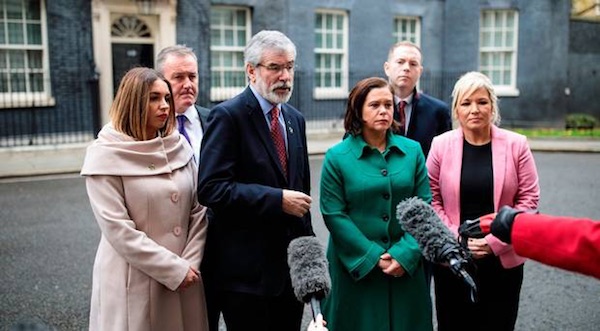
Gerry Adams has described as “an act of bad faith” a move by the British government to add a new section about an amnesty for British crown forces onto a bill for the implementation of the 2014 Stormont House Agreement.
The move, an apparent sop to the Tories’ allies in the DUP ahead of their annual conference this weekend, is a new blow to the 1998 Good Friday Agreement, which the 2014 deal was originally intended to help implement.
It has also underlined the apparent the extreme difficulties facing the current talks process at a time when confidence is already low.
Mr Adams spoke out angrily after meeting British Prime Minister Theresa May.
“That is an act of bad faith, we weren’t told this, we understand the Irish government weren’t told this,” Mr Adams said.
“So how on earth can a British prime minister hope to persuade anybody that there’s a possibility of a new dispensation emerging when she takes up this position and her secretary of state takes up this position also?”
Conservative and unionist MPs had sought a blanket “statute of limitations” to prevent Crown force members being prosecuted for offences in Ireland. ‘The Sun’, a British tabloid newspaper which had campaigned for the amnesty, said the move was a “huge victory” for the paper.
The Dublin government said it would “not look favourably” on the amnesty measure in the North.
“There are no amnesties from prosecution provided for in the Good Friday Agreement or any subsequent agreements including the Stormont House Agreement,” a spokesman for the Department of Foreign Affairs declared.
Foreign Minister Simon Coveney said he feared the plan had the “potential to undermine consultation from day one”.
A range of mechanisms to deal with the conflict legacy were agreed in the 2014 Stormont House Agreement, but an amnesty was not among them.
The original proposals, including a new independent investigatory unit, a truth recovery body and an oral archive, are on hold due to a number of outstanding disputes. One is the issue of “national security” which the British government has insisted it can cite as a reason to withhold documents from bereaved families.
Only four soldiers have been convicted of murder during the conflict, serving brief jail terms before returning to the British Army and receiving a promotion.
DUP MP Ian Paisley Jr described the potential blanket amnesty as “fantastic news” and “another victory for common sense”. DUP leader Arlene Foster did not comment on the development but said Sinn Fein must stop “glorifying the murders of innocent people.”
‘TERRORIST’
Speaking after her separate meeting with Mrs May, Foster claimed remarks made at Sinn Fein’s Ard Fheis were “quite disgraceful”. It is though Foster was referring to a tribute paid to the late Martin McGuinness at the party conference last weekend. There was a cheer when delegates were told that the former Stormont deputy first minister, Mr McGuinness, had been a “proud member of the IRA”.
Mr Adams, however, rejected Mrs Foster’s allegations, saying they were an excuse not to strike a deal. He said he also wanted to refute the use of the term ‘terrorism’.
“Pejorative terms like that, which are about the sons and daughters of families, husbands and wives of families, who happened to serve in the Irish Republican Army and who died in the conflict,” he said. “I don’t use those terms. So let’s have a wee bit of sense about this.”
Speaking after the meeting, Mrs May claimed the issues dividing the parties are relatively small in number, focusing mainly around culture, legacy, identity and the future stability of the devolved institutions.
“While not in any way underestimating the challenges involved, I believe that a way forward can be found and an agreement reached,” she said.
BIGC TO RETURN?
Sinn Fein has called for the British-Irish Intergovernmental Conference to be convened to consider a way forward. The Taoiseach Leo Varadkar said he is to proceed to seeking a meeting (of the conference) in the New Year.
The BIGC consists of ministers from the British and Irish governments. It last met regularly during the period 2002 - 2007 when the Stormont Executive was suspended.
The conference promotes bilateral co-operation at all levels of the British and Irish governments on matters of mutual interest. The DUP has described the body as a “talking shop which has not met since 2007”.
Mr Varadkar said he had told the British prime minister, “that the Irish government could not accept a return to direct rule as it existed prior to the Good Friday Agreement”.
He also said that under the Good Friday Agreement “if nothing’s devolved then everything is devolved to the British-Irish Intergovernmental Conference”.
![[Irish Republican News]](https://republican-news.org/graphics/title_gifs/rn.gif)
![[Irish Republican News]](https://republican-news.org/graphics/title_gifs/harp.gif)

